- Home
- Linda Newbery
Andie's Moon
Andie's Moon Read online
About The Historical House
This series is a unique collaboration between three award-winning authors, Adèle Geras, Linda Newbery and Ann Turnbull, all writing about one very special house and the extraordinary young women who have lived there throughout history.
Adèle Geras
Lizzie’s Wish
Cecily’s Portrait
Linda Newbery
Polly’s March
Andie’s Moon
Ann Turnbull
Josie Under Fire
Mary Ann & Miss Mozart
About this book
Andie dreams of becoming an artist. Her best paintings are inspired by the moon and she’s excited about the first moon landing. But she’s also worried it may lose its magic once man has set foot there.
She loves staying in Chelsea, with the fashion, music and art galleries along the trendy King’s Road. There’s even a real artist living in the flat downstairs. Could Andie’s paintings be good enough to win his approval?
An irresistible novel set against the vivid backdrop of one of the most thrilling moments in modern history.
To Ann and Adèle, with love.
Special thanks to Dorothy Hopkins and to John Liffen of the Science Museum, and of course to Megan Larkin, who started it all off.
Floor plans of 6 Chelsea Walk in 1969
Download the floor plan from Andie’s Moon at the Usborne Quicklinks website
Contents
About The Historical House
About this book
Dedication
Floor plans of 6 Chelsea Walk in 1969
Chapter 1
Fly me to the Moon
Chapter 2
Feet on the Ground
Chapter 3
Moonscape
Chapter 4
Through the Roof
Chapter 5
Star-struck
Chapter 6
Grounded
Chapter 7
Ascent
Chapter 8
Skyhopping
Chapter 9
Crash-landing
Chapter 10
Mountains on the Moon
Chapter 11
East of the Sun, West of the Moon
Chapter 12
Everyone’s Gone to the Moon
Chapter 13
Down to Earth
Chapter 14
One Giant Leap
Chapter 15
The Slough of Despond
Chapter 16
Splashdown
Chapter 17
Sparkles
Chapter 18
We Are Stardust
Author’s note
About the author
Usborne Quicklinks
Collect the series
Copyright
Chapter One
Fly me to the Moon
Andie didn’t know where she was – only that something had woken her, and she was staring into darkness.
She sat up, clutching her pillow. The room came into focus: dark shapes of wardrobe and chest of drawers; tall, light rectangles of curtained windows. It wasn’t her own bedroom, cluttered and square, with its one small window where the street light shone in; this was a much larger space. From the other bed, farthest from the door, came soft steady breathing.
Of course. She was in the Chelsea flat – this strange new place that seemed so grand and spacious. This was her first night in the room she and Prune were to share, the bedroom that was really Anne Rutherford’s. The door to the hall was open, but there were no lights on, so Mum and Dad must have gone to bed too. Andie pummelled her pillow into a comfortable hollow, rolled over and settled for sleep – then heard, again, the sound that had got into her dream and woken her. Across the ceiling, directly above her bed, creaked the slow tread of feet.
She sat up and groped for the switch of her bedside lamp.
“Prune!” she called softly. “Prune! There’s a burglar or something!”
Prune was a heavy sleeper. Andie had to cross the carpet and shake her by the shoulder before she stirred, and by that time the creaking had stopped.
“Wassamatter?” Prune muttered.
“There’s someone creeping about!”
“What? Mmm. You are.” Prune propped herself on one elbow and pushed her hair out of her eyes.
“No, listen! There’s someone on the floor above – I heard footsteps.”
“P’raps someone lives up there. Or you were dreaming. Go back to sleep.”
Rolling over to face the wall, Prune tugged the sheet up to her ears. Andie climbed back into bed, and looked at her watch. Ten past midnight. Not a sound from above now; maybe she’d only imagined the footsteps. She clicked off the lamp, and lay staring up at the high ceiling, wondering what was beyond it.
That man from downstairs, Patrick, who’d shown them round, had said something about attic rooms where servants used to live, but he hadn’t mentioned anyone living there now. Why would someone be creeping around the attic at midnight?
Andie felt a shiver of excitement run through her. This was so different from home, which, in comparison to Number Six, Chelsea Walk, seemed very dull – a brick semi, identical to all the others nearby. This house was old – built in seventeen hundred and something. Who would even know how many people had lived here, over the years? It had been a big family house, Patrick had told them, before it was divided into flats. Imagine, one family having this whole huge place to themselves! They must have been incredibly rich. When Andie thought of all the different people who must have walked up and down the stairs and moved through these rooms and slept in the house and breathed its air, she felt dizzy. It was like looking through the wrong end of a telescope, back into history. She was vague about the details, but she imagined a procession of people, their clothes and faces and hair getting more and more old-fashioned, all the way back to seventeen-hundred-and-whatever-it-was. They crowded into her mind, in black-and-white photographs at first, then portraits in oval frames.
Not only did this house have three floors, each one a separate flat, but it had the attic and a cellar as well – making it, Andie thought, a five-storey house, really. As soon as Patrick mentioned the attic, she’d pictured herself sitting up there with her paints and an easel. She hadn’t got an easel, but to be the kind of painter who sat in an attic, she’d need to get one somehow. If it was a bit sparse up there, just bare boards, so much the better. That would make her feel like a proper artist.
But the noise. The footsteps.
What if something awful had happened here, and someone was prowling about the attic at night, unhappy, or seeking revenge?
No. Andie didn’t believe in ghosts. She definitely didn’t.
She pushed back her bedclothes and swung her feet to the carpet. Careful not to wake Prune again, she tiptoed to the window and looked out. She could hear traffic, along the Embankment, and over the nearby bridge; through the foliage of the trees that fronted Chelsea Walk she saw the glow of street lamps, and, beyond, the glimmer of water that was the River Thames. At home in Slough, in their cul-de-sac, the nights were quiet apart from the odd late car returning home, but Andie supposed that London never slept. There was a hum of busyness, even at this late hour.
And above it all hung the moon, the full moon, cool and silver, the same moon that Andie saw when she looked up from her own garden at home.
Wasn’t there a saying, she thought, about it being unlucky to look at the moon through glass? Or was it only looking at the new moon through glass? Not wanting to bring bad luck, not on the first night of her stay in London, she pushed up the lower pane of the sash window and kneeled on the floor, her elbows on the sill. Now she could gaze as much as she wanted, with the night air fresh on her face.
When she was little, Andie pretended to see the Man in the Moon, because Dad used to tell her a story about him. She liked to imagine that the moon’s greeny-blue shadows formed the outline of a face, a wise and good-humoured face. The Man, she thought, was smiling at her. He was hard to make out, but perhaps that was why not everyone could see him. He only appeared to especially observant people, and Andie liked to think she was one of those.
Now, everyone was talking about man on the moon, because in a fortnight’s time the American astronauts would not only fly to the moon, but land there. Just thinking about it gave Andie a thrill of excitement and disbelief. Did the moon know?
“Fly me to the Moon” – that was one of the songs on Mum’s favourite Frank Sinatra record. The familiar tune started to sing itself in Andie’s head; because of Apollo 11, it was always being played on the radio this summer. Soon, flying to the moon wouldn’t be the fantasy it had once been. But, gazing at it now – at her moon, the moon she always looked for, and the moon she used to think looked back at her – Andie couldn’t quite take in that this was the same place they were aiming for. The moon was Earth’s mysterious companion, keeping half of itself always hidden. The space rockets seemed like ropes, lassoes, thrown out to catch and tether it and bring it closer. Apollo 10 had already orbited, with three astronauts aboard, and they’d seen what no human had ever seen before – the far side of the moon.
Mystery, or discovery? Which was better? And could you have both?
A moonscape began to form in her mind, sharp, clear and perfect. It was far better than she’d ever be able to achieve with paints and brush; but there it was, demanding to be painted. Tomorrow she’d do it.
She crept back into bed, hearing, as she did so, another small creak from above. Andie froze, listening.
“Prune?” she whispered. “Are you awake?”
But Prune gave no sign of having heard. Andie stayed where she was for a few more moments, ears straining. Then, hearing no more, she gave up, lay down, and closed her eyes firmly.
Chapter Two
Feet on the Ground
Mungojerrie and Rumpelteazer were the main reason for the Miller family’s stay at Chelsea Walk. As Andie was the only one who liked cats, she’d been appointed cat-sitter in chief. She didn’t mind that. Forking out Kit-e-Kat twice a day, and keeping the litter tray clean, wasn’t much to do in return for a luxurious London flat to stay in.
This kitchen was almost twice as big as the one at home. Everything was white and gleaming. It looked freshly cleaned when they’d arrived, but the first thing Mum had done was get out rubber gloves and scourers and sponges, to wash and disinfect every surface, tap and plughole.
“You don’t have to do that!” Dad told her. “The Rutherfords’ cleaner comes every Wednesday.”
“You never know.” Mum was sprinkling bleach powder in the sink. “It looks very nice, but who knows what germs are lurking? Especially with those cats shedding fleas and hairs everywhere.”
The cats, like the flat, belonged to the Rutherfords, who were partners in the insurance company Dad had now joined. While Mr. and Mrs. Rutherford, with their daughter Anne, were in Manchester to set up a new branch there, and Dad, with his new job in the King’s Road office, wanted to move to London, it solved everyone’s problems for the Millers to move into Number Six, Chelsea Walk. The house at home was up for sale, and Andie’s parents were looking for a house or flat in Chelsea. Such a move would mean leaving behind friends, school, everything that was familiar – daunting, but exciting.
Meanwhile, neither Andie nor Prune could quite believe their luck at getting an extra two weeks of summer holiday. For Prune, who had just finished her O-Levels, coming to Chelsea was the perfect reward, the closest thing to heaven. According to Honey magazine, which Prune devoured every month from cover to cover, Chelsea was the trendy heart of London, the switched-on scene, the hub of the fashion universe. “Maybe I’ll get taken on by a modelling agency!” she had told Andie, at least five times. “There are loads of them in Chelsea. What if I turn out to be the next Twiggy or Jean Shrimpton?”
Andie could have pointed out that both Twiggy and Jean Shrimpton were a lot prettier as well as a lot thinner than Prune, so maybe it was as well that she hadn’t been asked for her opinion. But she knew that Prune would be doing a lot of hanging around the King’s Road – starting today, most likely. Prune hadn’t decided yet what to do in September. Dad wanted her to stay on at school (but which school? Hillsden High, back in Slough – or, if they moved house, one near here?), while Mum thought she should enrol on a secretarial course. Prune wasn’t keen on either.
Part of the fun of missing school was to think of all the lessons you weren’t having. Andie ran through her Friday timetable: Maths, Biology, French and English, and finally double Art. She felt a little leap of joy inside, at the thought of not being there.
Art was her least favourite lesson. It ought to have been the time of the week she most looked forward to, which made it worse that she hated it. There was something so dispiriting about filing into the big, raftered space on the school’s top floor, and hearing Miss Temple’s brisk, “Sit down, girls.” Art with Miss Temple was deadly. She liked the girls to do life drawings or portraits of each other, in pencil or in the powder paints that no matter how thickly you mixed them never kept their brightness on the cheap spongy paper that drained everything of life. The paintbrushes were old and scrubby and looked as if generations of schoolgirls had chewed their wooden ends in frustration. Sometimes, Miss Temple experimented with what she called Modern Art, by which she meant looking at Picasso prints and trying to imitate them by drawing things chopped up into chunks, or viewed from strange angles.
“But Modern Art doesn’t mean copying someone else, who’s been doing it like that for years and years!” Andie objected. “Modern is new. Modern is now.”
Andie and Miss Temple didn’t get on at all. Andie liked to do things her own way, which made Miss Temple go tight-lipped and offended. “When you’ve spent several years at art college, Andrea, maybe you can come back and tell me how to teach. Until then, I strongly recommend that you do as I tell you.” And just being in the same room as Miss Temple sent Andie into one of her dark, depressed moods in which nothing seemed worth doing.
On Andie’s report, Miss Temple had written, in her tight, knotty handwriting: Andrea has considerable talent, but no self-discipline at all. And a stingy B-, and C- for effort. Andie’s friend Barbara, who didn’t even like Art but managed to turn out neat, boring pictures week after week according to Miss Temple’s instructions, got B+ and A-.
“Oh, Andie!” Mum said, reading the report. “You really mustn’t be obstinate. I don’t like you getting into trouble at school.”
Andie only took notice of the “considerable talent” bit. Well, that was something, however grudgingly Miss Temple had squeezed out the words. Going to art college was exactly what she had in mind for herself, but Mum and Dad were going to need an awful lot of persuading. “Anything goes, these days. It’s all Pop Art now, isn’t it?” That was Dad’s view. “You can be as good as you like at drawing and painting, but where’ll that get you? People do comic-book cartoons, or pictures of soup tins, and call that Art.”
Mum’s line was, “It’s a nice hobby, painting. You can do it at evening classes or join a group. But you’ll never make money at it.”
“Money’s not the most important thing there is!” Andie protested.
“No, I know. But you try living without it, and you’ll realize that it is quite important. When it comes to getting a job, you’ll do far better to concentrate on your Maths and your English. Then you can learn shorthand and typing. I keep telling Prue, a good grounding like that can get you a job almost anywhere.”
“Yes, but only boring jobs in offices!”
“Boring, you may think,” retorted Mum, “but office jobs pay well. We wouldn’t be going to London, if it wasn’t for Dad’s job. And as soon as we get there, I’l
l be looking for office work as well. If I decided to sit about all day painting pictures, how would we eat?”
Sometimes Andie gave up arguing; sometimes she didn’t. Mum was like that, always going on about keeping your feet on the ground and not having your head in the clouds. Gaze at the moon and fall in the gutter, that was one of her sayings. A daft one, Andie thought. Surely, even if you fell over and grazed your knees or twisted your ankle, it’d be better than plodding along looking at the gutter, not raising your eyes any higher to see what was shining in the sky? You’d miss the moon altogether, doing that.
Mum could talk as much as she liked about jobs and offices, but nothing was going to make Andie give up her ambition. How could filing and shorthand-typing ever match the excitement of paint and paper and light?
The Rutherfords’ two cats were the haughtiest Andie had ever met. The cat she knew best, Ringo, who belonged to Barbara, would have been purring loudly and twining himself around her legs. Mungojerrie and Rumpelteazer sat upright in their basket and stared in disdain. You’re ten minutes late, they might as well have said aloud. We hope you’re not planning to make this a habit.
Mrs. Rutherford had left a long list of instructions, which Andie had already studied carefully but now read again. The cats were to be fed twice a day, at eight in the morning and six in the evening precisely, always from clean dishes. They liked full-cream milk served at room temperature, and on Sunday evenings they were to have tinned pilchards as a treat. Both were large and sleek, with velvet collars. Mungojerrie was black with white chin and whiskers; Rumpelteazer striped ginger, with a pink nose.
Andie placed the dishes of meat on the cats’ special mat, and filled one bowl with water, a second with milk. The rest of today would be free for going out and finding her way around. Later, this evening, the Millers had been invited down to Patrick’s flat to meet everyone who lived in the house.
When the cats had finished picking at their breakfast of minced morsels with haddock, and were sitting on the window sill washing their paws and faces, Andie went to see if Prune was getting up.

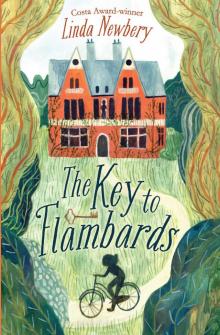 The Key to Flambards
The Key to Flambards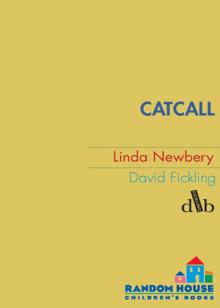 Catcall
Catcall Sisterland
Sisterland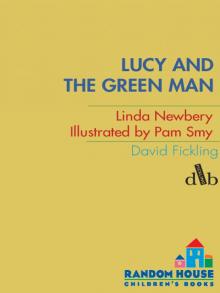 Lucy and the Green Man
Lucy and the Green Man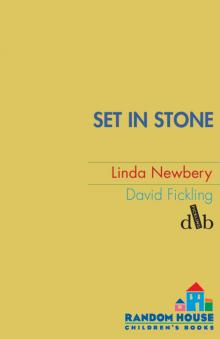 Set In Stone
Set In Stone Lob
Lob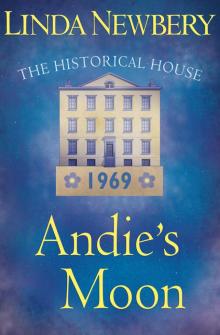 Andie's Moon
Andie's Moon The Shell House
The Shell House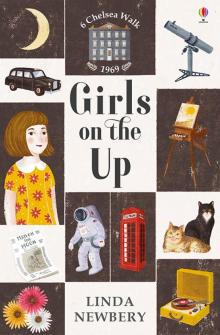 Girls on the Up
Girls on the Up The Sandfather
The Sandfather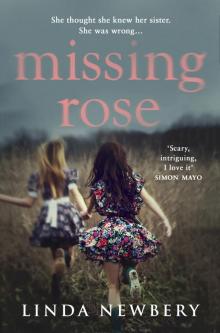 Missing Rose
Missing Rose Polly's March
Polly's March Quarter Past Two on a Wednesday Afternoon
Quarter Past Two on a Wednesday Afternoon Flightsend
Flightsend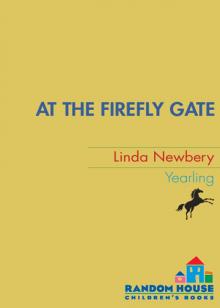 At the Firefly Gate
At the Firefly Gate